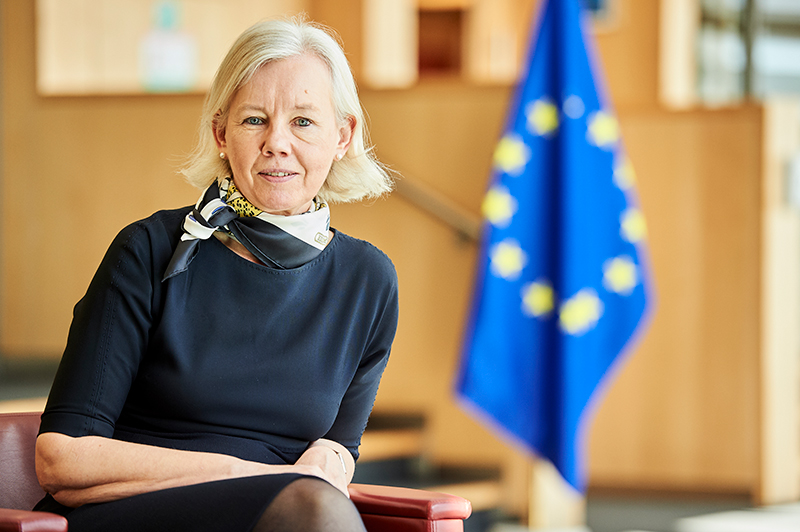Interview with Alexandra Jour-Schroeder

Related topics
Capital Markets Uniondate: 01/10/2021
In March of this year, Alexandra Jour-Schroeder took on the role of Deputy Director-General of the Directorate-General for Financial Stability, Financial Services and Capital Markets Union (DG FISMA). A little more than half a year later, she speaks about her first months in the job, and what she sees as the major challenges ahead.
You joined DG FISMA as Deputy Director-General earlier this year. What have the first few months been like?
My first months in DG FISMA have been an exciting journey into the challenging world of financial regulation. I particularly enjoyed getting involved in the work on the green and digital transition – both EU flagship policies where DG FISMA plays an important role.
The financial sector is key in boosting sustainable investment. Moving the first EU Delegated Act on Taxonomy on climate mitigation and adaptation to adoption by the Commission was an exciting start in my new position. I very much hope that this innovative tool will play a key role in our common goal to reach ambitious climate targets.
Digital finance is another issue I’ve been devoting a lot of attention to. The digital transformation and all the opportunities offered by the digital revolution are things we must embrace. Here, I’d like to mention crypto assets, which have great potential but need adequate regulation. Another very interesting project – the digital Euro – has appeared on our radar screen since I joined this DG.
Finally, I have also been able to give my views on a number of important legislative projects that should see the light of the day in the weeks and months to come. Basel III, Solvency II, the MIFID/R revision, revisions of long-term investment funds and the rules for fund managers – to name but a few. So in short: it has been an intense and very enjoyable start!
What do you see as the major challenges in the European banking and capital markets union sector in the coming months and years?
Banking supervision in the euro area is now at cruising speed with the Single Supervisory Mechanism (SSM). We actually saw, throughout the COVID-19 situation, that the EU banking sector is in a much better condition than 10 years ago. However, it is no secret that the banking union is not complete yet. Bank crisis management and the development of an EU deposit insurance framework are still major challenges we need to address. When it comes to the capital market union, with the Commission action plan of September 2020 we have a clear and ambitious road map. Now it is time to deliver. As I said before, this year we will present a number of legal initiatives that should allow us to further develop the EU's capital markets. This will help ensure access to market financing – including those that contribute to the digital and green transitions. We will also invest more in a European financial competence framework, in particular improving financial literacy. I think we need a genuine new approach in financial education, to increase young people’s interest in – and ability to manage – financial matters.
You’ve had a number of previous positions, both at the European Commission and in the German federal government. What were some of the most interesting issues or areas you’ve worked on? And how does your previous experience help you in your current role?
During 25 years of professional experience in EU matters, you come across quite a lot of interesting issues. I remember well in the early 1990s at the German Ministry of Economy, working to get the approval of the Commission for large amounts of financial aid to re-build the economy in the context of German re-unification. It was actually my first contact with the European Commission before I moved to Brussels. I will also certainly always remember the “common charger” – one of the projects I worked on in DG Industrial Policies. Although we managed to agree with industry to produce the same charger for mobile phones and devices, that agreement unfortunately did not last long. I am very happy to now see progress towards a legal act requiring a common charger based on energy efficiency grounds. With the establishment of the European Public Prosecutor´s Office, we started to work 10 years ago to address fraud in the use of the EU budget. When the Office took up work in June this year, this was a real dream came true for me. Last but definitely not least, I managed, with the team of DG Justice and Consumers, the EU Representative Action. With it, for the first time, we made the right to collective redress across the EU possible for consumers.
During your time at DG JUST, you were involved in the EU’s work on anti-money laundering and counter terrorism financing, issues that fall within DG FISMA’s remit. What would you say are the most important steps the EU needs to take to tackle this problem?
The work on anti-money laundering (AML) and financial crime has indeed kept me busy for quite a few years – and with the new AML package on the negotiation table this will certainly continue. With the rules in the 4th and 5th AML Directives providing more transparency and accountability we felt we had made a step change in how we address a serious issue in the EU that also has a global dimension. There is, however, a problem with the concrete implementation of the rules. This is often paired with a lack of technical capability to prevent and pursue criminal activities on the ground. That is why our July AML package takes an even more ambitious approach, with a directly applicable regulation and the establishment of the Anti-Money Laundering Authority (AMLA). The AMLA is a dedicated, highly specialised agency with direct supervisory powers for larger financial institutions. With these new elements, I am confident that we can make the EU a safer place.
